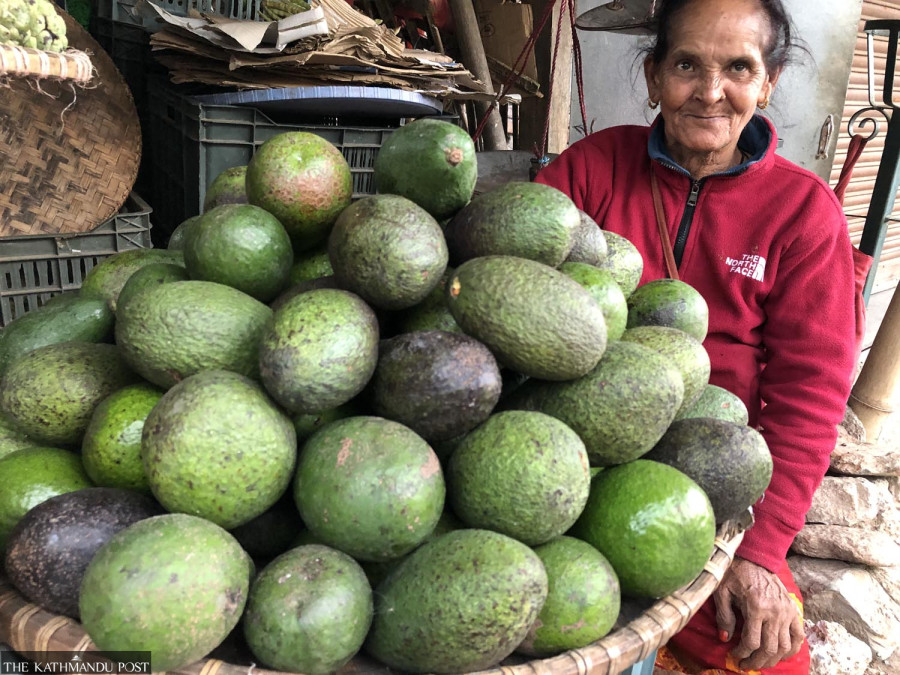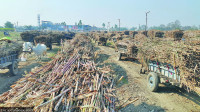Money
Orange farmers prosper after switching to avocados
The number of farmers growing avocado in Dhankuta increased from 1,963 to 4,926 in four years, according to officials.
Ramesh Chandra Adhikari
Orange farmer Jyotiram Pokhrel of Kachide, Dhankuta gave up growing the citrus fruit after many decades and switched to avocados. He had become tired of fighting diseases in his orange crop all the time.
“Orange trees are often infected by diseases. There is more money in cultivating avocados,” he said. Pokhrel has no regrets about his decision.
Avocado is nutritious and contains a wide variety of nutrients, including multiple vitamins and minerals. They have a green-skinned, fleshy body that may be pear-shaped, egg-shaped or spherical.
Like Pokhrel, dozens of farmers in Dhankuta have switched to commercial avocado farming in recent years.
Four years ago, there were 1,963 farmers engaged in avocado production in Dhankuta. As of last year, the number had jumped to 4,926, according to the Agriculture Knowledge Centre Dhankuta.
Farmers say avocado trees start producing fruit four to five years after planting. “We don’t have to worry much about market and prices like is the case with oranges.”
Farmer Gopal Wagle of Pallek, Dhankuta-3 said, “We are happy with the prices we have been getting for avocado.”
The fruit is not native to Dhankuta. Locals believe the fruit was introduced in the district about four decades ago.
A British agriculture scientist who worked at the Agriculture Research Station in Pakhribas, Dhankuta had given an avocado plant to Bharat Joshi of Bal Mandir Tol, Dhankuta-5.
Joshi’s son Sujan remembers the tree bearing fruit after five years. “We did not like its taste at first,” he said.
The fruit remained neglected for a few years until a foreigner working at a non-governmental organisation bought the fruit for Rs50 per kg. Word spread and more people started buying avocados.
The fruit started becoming popular in the district, but Joshi didn't know what it was called. Around three and a half decades ago, technicians from the District Agriculture Office gave him details about the fruit.
In the following years, more people started growing avocados. Around three decades ago, the Joshi family started selling avocado saplings at Rs10 each. Avocado farming then spread to neighbouring districts.
Leading farmers of the district have played an important role in promoting commercial farming of the fruit.
Agriculture technician Surya Sapkota said farmers shifted towards avocado farming after orange trees were affected by various diseases such as rotting roots.
Senior agriculture technician Jeevan Rai believes avocado was brought to Nepal more than five decades ago, even before the establishment of the Agriculture Research Station at Pakhribas, Dhankuta.
“The engineers employed in the construction of the Dharan-Dhankuta road more than four decades ago introduced the fruit in the region,” said Rai.
The local administration declared Dhankuta an avocado capital in 2018 due to the rising popularity of the fruit. In the past four years, the district has organised avocado fairs twice to promote its cultivation.
Commercial avocado farming has become a key income generator in the district.
“The fairs have encouraged farmers engaged in commercial avocado production,” said Chintan Tamang, mayor of Dhankuta Municipality. “Its cultivation spread after the municipality started providing free saplings.”
The number of farmers producing saplings has also increased in recent years.
According to the Agriculture Knowledge Centre in the district, more than 300,000 avocado saplings are produced annually.
Local farmers have received orders for saplings from Palpa, Tanahu, Syangja, Lamjung, Chitwan, Kaski and Gorkha districts.
Nursery owner Bharat Guragain said he sold around 7,000 avocado saplings last year. “With demand for the fruit growing, more people have been planting avocado,” Guragain said.
The number of nurseries producing avocado saplings has increased from five nurseries four years ago to 137 last year.
To meet the increasing demand, the Agriculture Research Station, Pakhribas has carried out research to produce saplings through tissue culture.
“Using this method, at least 10 saplings can be produced from a seed,” said Govinda Timsina, chief of the station.
The station also plans to adopt a grafting method with assistance from foreign technicians in the coming days.
Four years ago, avocado farmers in Dhankuta Municipality sold 77.7 tonnes of the fruit and earned Rs2.3 million. Last year, they sold 239.4 tonnes worth Rs32 million.
The price has also increased and boosted farmer incomes in recent years, according to the municipality. “In the past four years, the average price of avocado in the district has swelled nearly fourfold from Rs30 to Rs110 per kg.”
The municipality's statistics show that 4,926 farmers have planted avocados on 12,999 hectares.
Farmers also worry about how long the good times will last, and if avocado farming will not share the same fate as orange farming.
Farmers say issues such as the fruits falling from the trees before they have ripened have increased in recent years. The trees have also been attacked by worms.
“Along with the attraction for avocado farming, disease-related issues have also increased in recent years,” said Khemraj Thapa, chairman of the Avocado Farmers Group of the district. “Farmers' investment could go to waste in the absence of technical knowledge.”
Mayor Tamang said the municipality had started working to address farmer concerns in coordination with the Agriculture Research Station, Pakhribas.
Farmers have also been concerned about not being able to grow other vegetables near the avocado trees as the ground around the trees turns dry and becomes unsuitable for growing any other crop.
Technicians say problems have emerged because avocado farmers have not been following the prescribed method for planting the trees.
“The trees should be planted 20 feet apart,” said Bhaktaman Rai, an agriculture technician. “Problems arise if farmers do not follow this rule and plant more trees in a small area with the intention of producing more fruits.”
Rai agrees that farmer complaints regarding not receiving the required technical support in times of need have increased recently.
Farmers have also attempted to produce avocado oil. Gopal Wagle and his wife Kamala of Dhankuta-3 produced avocado oil three years ago using a traditional home-made machine.
“We produced one litre of oil from 10 kg of avocados,” said Gopal adding, “We need modern technology for this purpose.”
The Wagles sold the oil at Rs2,000 per litre, but they have stopped making avocado oil. “Demand for oil in the market has fallen short of our expectations,” said Wagle.
Entrepreneur Prakiti Gautam believes it is necessary to brand the fruit to make various products. “Beside selling the fruits, we need to process them and make various products,” said Gautam.




 9.21°C Kathmandu
9.21°C Kathmandu.jpg)













